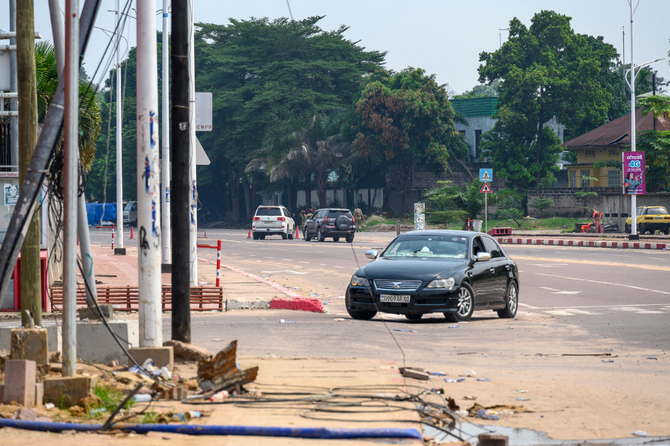KINSHASA: The DR Congo military on Sunday said it had thwarted an “attempted coup” near the offices of President Felix Tshisekedi in Kinshasa involving “foreigners and Congolese.”
It happened in the early hours of the morning outside the residence of Economy Minister Vital Kamerhe, in the Gombe area in the north of the capital, near the Palais de la Nation that houses the president’s offices, a spokesman said.
“An attempted coup d’etat has been stopped by the defense and security forces,” said General Sylvain Ekenge in a message broadcast on national television.
Shots were also heard near the Palais de la Nation at the time of the coup attempt, according to a number of sources.
Later on Sunday, army spokesman General Sylvain Ekenge said several Americans and a British man were part of the group involved in the operation.
The coup bid was led by Christian Malanga, a Congolese man who was a “naturalized American” and had been “definitively neutralized” — killed — by the security forces, Ekenge said in a broadcast on Sunday evening.
The group was made up of “several nationalities,” Ekenge said, adding that around 40 of the attackers had been arrested, and four — including Malanga — killed.
“We also have a naturalized British subject, the number two of the group,” the spokesman added. Malanga’s son, Marcel Malanga, was also among the attackers, he said.
Links to deposed dictator
Kamerhe and his family were not harmed in the attack but two police officers looking after them were killed, said a source close to the minister.
The group had planned to attack the home of the new Prime Minister Judith Suminwa, and the residence of Defense Minister Jean-Pierre Bemba.
But they “could not identify the home” of Suminwa and had not been able to find Bemba at his residence.
After the attack at Kamerhe’s home, the group then went to the Palais de la Nation, brandishing flags of Zaire, the name of the Democratic Republic of Congo under the dictator Mobutu Sese Seko, who was overthrown in 1997.
“I am shocked by the events this morning and very worried by the reports of American citizens allegedly being involved,” Lucy Tamlyn, the US ambassador to the DRC, posted on X, formerly Twitter.
“Rest assured that we are cooperating with authorities in DRC to the fullest extent possible, as they investigate these criminal acts and hold accountable any American citizen involved.”
France’s ambassador had reported automatic weapon fire in the area, urging nationals to avoid it.
During the day, certain streets near the Palais de la Nation remained closed to traffic, but the situation appeared calm, AFP journalists reported.
“I’m a little afraid to move around like that in Gombe, there aren’t many people... But I have to sell my goods,” bread-seller Jean-Mbuta said.
Videos on social media showed men in fatigues at the Palais de la Nation, brandishing flags of Zaire.
The Zaire flag was mostly green while the DRC one is largely blue.
“The time has arrived, long live Zaire, long live the children of Mobutu,” a man who appeared to be the head of the group said in Lingala, a language spoken in parts of the DRC.
“Felix has fallen... we are victorious,” he added.
AFP was also unable to verify the videos.
Tshisekedi was re-elected at the end of December when he received more than 70 percent of votes in the first round.
The parties backing him won around 90 percent of seats in the parliamentary elections held the same day.
But he is yet to form a government some five months after the elections.
Kamerhe on April 23 was named as a candidate for president of the National Assembly, the DRC’s main legislative body.






























